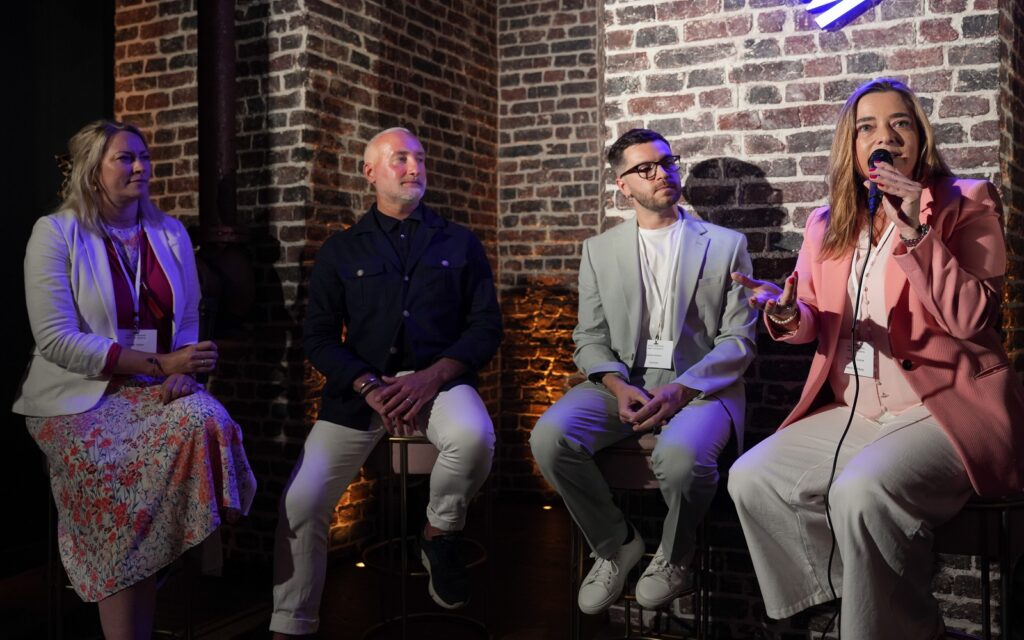Revolutionizing Hospitality: A Fusion of Reality, AI, and the Metaverse

Last month, Hotel Designs held its annual MEET UP North networking event at award-winning hotel, LEVEN, where the design industry came together for an informal evening of chat, laughter, and forming new connections. During the event, Editor Sophie Harper hosted a panel with Timothy Griffin, Principal, Wellbrook Hospitality and Co-founder, LEVEN, Veronica Givone, Principal and Managing Director of Hospitality, IA Interior Architects, and James Addison, Creative Director, forpeople, to discuss the wonders of digital hospitality and what the future holds for the industry within the realms of AI and the metaverse.
Sophie Harper opened the conversation by posing questions to the panel that had been orchestrated with the use of ChatGPT, pointing out the relevance of artificial intelligence already in everyday use.
“I asked ChatGPT to set out five questions to put to a panel on the topic of: digital hospitality: blending reality, AI, and the metaverse,” Sophie explained. “I told the software the audience would be made up of interior designers and hoteliers within the hospitality design sector, that the conversation would be hosted by me, and gave it the names and titles of our panellists, and ChatGPT produced a solid script in less than 30 seconds.”
Pointing out the usefulness of this sort of software, the group agreed that AI was indeed a helpful tool in providing day-to-day support, but that actually in this instance, conversation and human interaction was key, and essential for hospitality experiences.
Timothy Griffin indicated his enthusiasm for exploration of different technologies in enhancing the guest experience but that it shouldn’t be viewed as something that could replace people. “The human touch will always be central to the successful hospitality experience,” he said. “Our industry is one of glorious experiences – whether it is interior designs or architecture that elicit an emotional response, food and drink that delight, and connections to our hosts that make us feel at home and bring a smile. The digital revolution in our industry, if managed correctly, should be used to enhance the experience of our guests behind the scenes, and not create a barrier to executing on the true purpose of hospitality – to make people feel great!”
James Addison was of the same opinion. “We’re on the cusp of a massive transformation right now. AI is poised to create even more opportunities for hotel staff to connect with guests more meaningfully. By handling routine tasks, AI will free up staff to focus on forging real connections and crafting memorable stays. I foresee a hybrid approach, blending virtual assistance with real life concierges – regularly collecting guest feedback and unique preferences. The ability to act on these more readily will ensure digital integrations enhance, rather than detract from, a seamless and personable guest experience. I believe AI is a tool and it should be used to empower staff, not replace them. Above all, it’s about creating a special experience for guests that makes every stay memorable – if we lose sight of that then we’ve gone too far.”
“Furthermore, AI and augmented reality technologies bring the opportunity to create a new layer of engagement to hotel environments, allowing guests to uncover stories and find moments of delight in every corridor, bar and lobby,” he added. “It’s these stories that will enrich the guest experience in profound new ways.”
Although herself a regular user of artificial intelligence when it comes to daily admin, Veronica admitted she had concerns about the overuse of AI and the blurring of lines when using AI in a more creative capacity. She gave examples of using the technology to produce enhanced imagery and warned that clients might have unrealistic expectations and so we should be careful to be transparent about the use of things such as AI.
This led to the discussion of legal implications and a need for legislation to be implemented in order to ensure both the safety of jobs in future, as well as making clear to audiences – whether online or in person – are made aware that what they are viewing has not been created by a human.
At this point, the panel quizzed James on his thoughts being the only person on stage to have created an entirely fictional hotel, The Grande Finto, using AI. “Transparency about AI usage is crucial,” he agreed. “For instance, generative AI could create misleading images of hotel rooms, potentially disappointing guests and enabling fraudulent activities. Given AI’s inevitable widespread utilisation, it’s essential to inform guests when a service is AI-backed and how their data is utilised. Ethical biases in AI algorithms also mean a greater need for vigilance and awareness. Adoption of an industry-wide code of ethics on this subject is much needed.”
An advocate for hospitality space in the metaverse, with a plot dedicated to the LEVENverse, LEVEN’s very own digital property, Timothy pointed out the advances in technology were happening quickly and therefore we need to act responsibly and accordingly. “The dominant risks are around privacy and integrity. Obtaining consent from guests for AI and other technologies that require personal information or may be perceived as intrusive is critical. Furthermore, as AI becomes more advanced, and the metaverse experience more photorealistic it will be important for our industry, as well as others, to ensure there is integrity in the experience by articulating if something is AI generated or real. The line between real and fabricated will become increasingly blurred and we have an ethical responsibility to ensure it is understood.”
The panel aired their views on the possibility of alienating guests who were more adverse to using advanced technology and whether or not this might lead to a division in the market. James suggested that a blended approach where physical environments can be integrated with virtual extensions is the ideal solution. “Augmented Reality offers a solution by overlaying the metaverse onto physical spaces, creating deeper connections, a sense of discovery and much needed storytelling. While the trend for virtual spaces is growing, we don’t know where it’s going to end up next. I think the answer lies in physical stays enhanced with a virtual lens that you can dip in and out of at your leisure.”
“As an AI enthusiast, I remain optimistic about these advancements. While there are risks of technology misuse, I definitely encourage further experimentation and innovations to enhance guest experiences.” He concluded: “In today’s competitive landscape, having a great hotel is just the beginning – the real goal is creating compelling stories and connections that keep guests returning for more. New digital tools will help us get there.”
At the end of the discussion, the panel were descended on by the audience who wanted to ask further questions, while other guests chose to try out the virtual reality experience provided by IA Interior Architects in the main bar area.
Reflecting on the night’s events shortly afterwards, James said, “This was my first MEET UP event. I didn’t know what to expect and the atmosphere was buzzing. I felt really energised by the conversations happening in the room – some thought-provoking discussions about the topic of digital hospitality. Of course, the LEVEN hotel was the perfect setting for the night. Having virtually visited the LEVENverse it was great to finally experience and see the real thing.”
Timothy added, “It is always a pleasure to network with so many industry talents in one place and we are all thankful to Hotel Designs for bringing everyone together. Also, it was an honour to host everyone at LEVEN Manchester, our first in the series of LEVEN hotels.”
Source link
#Digital #hospitality #blending #reality #metaverse





